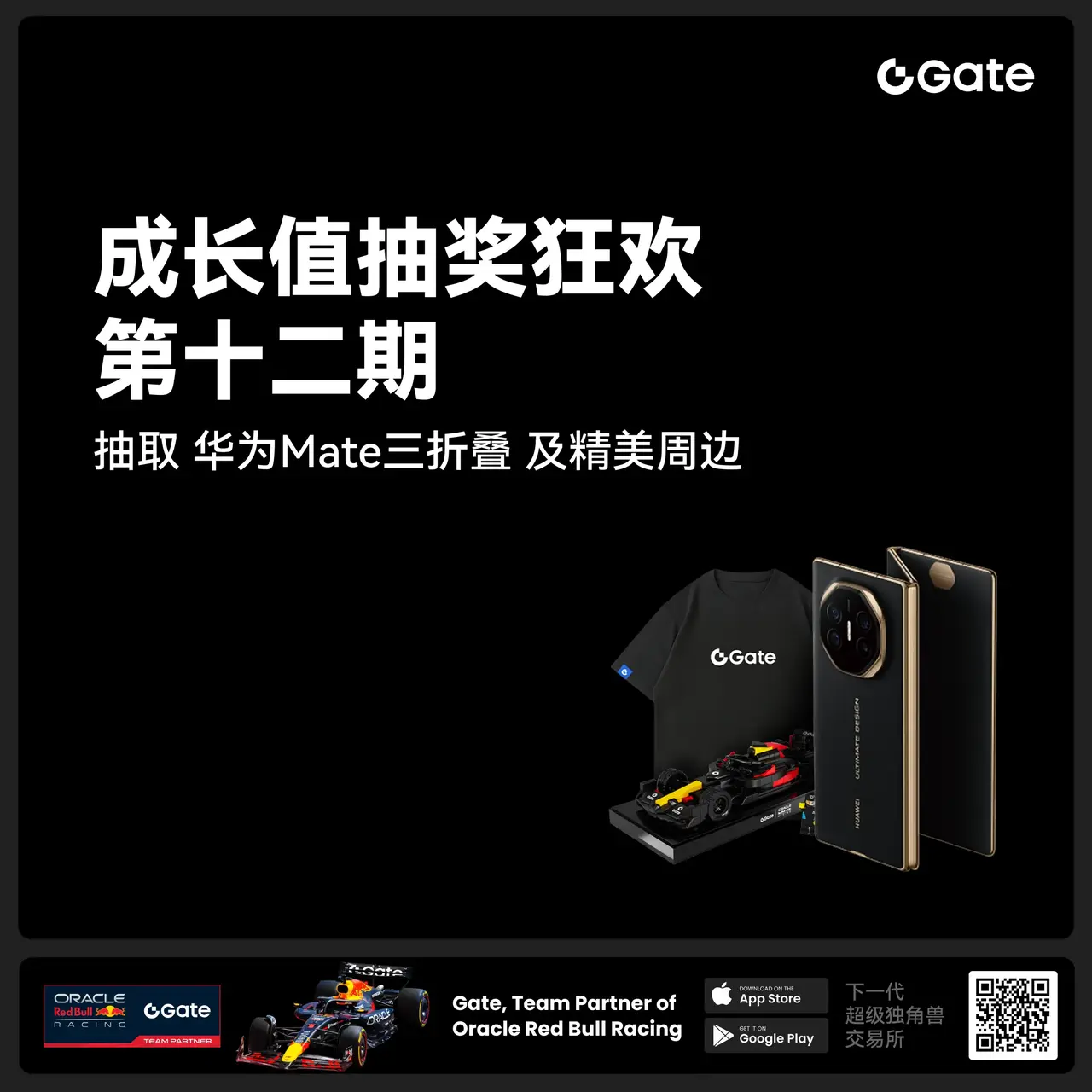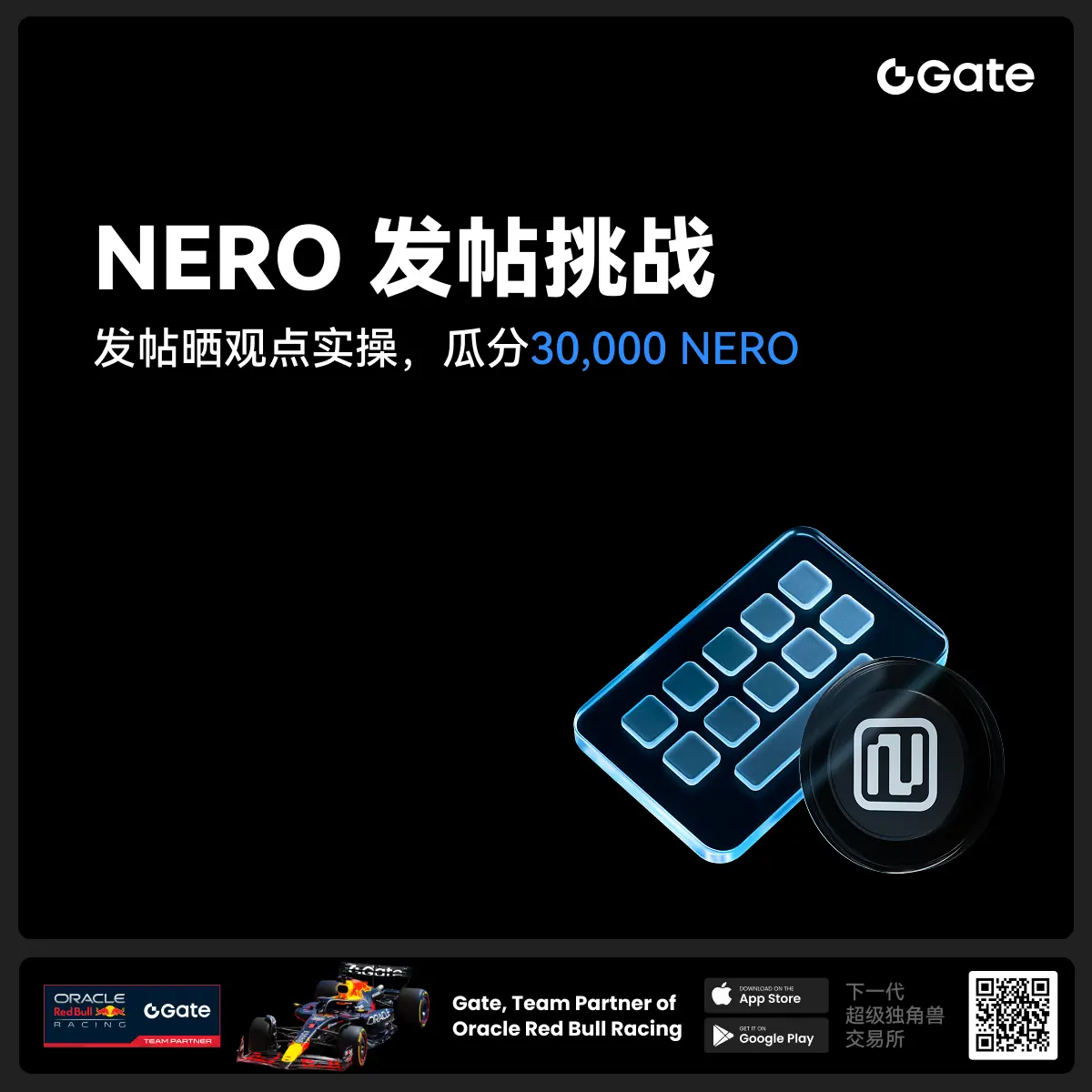- 话题1/3
34659 热度
23467 热度
40923 热度
7866 热度
19299 热度
- 置顶
- 🎉 #CandyDrop合约挑战# 正式开启!参与即可瓜分 6 BTC 豪华奖池!
📢 在 Gate 广场带话题发布你的合约体验
🎁 优质贴文用户瓜分$500 合约体验金券,20位名额等你上榜!
📅 活动时间:2025 年 8 月 1 日 15:00 - 8 月 15 日 19:00 (UTC+8)
👉 活动链接:https://www.gate.com/candy-drop/detail/BTC-98
敢合约,敢盈利
- 🎉 攒成长值,抽华为Mate三折叠!广场第 1️⃣ 2️⃣ 期夏季成长值抽奖大狂欢开启!
总奖池超 $10,000+,华为Mate三折叠手机、F1红牛赛车模型、Gate限量周边、热门代币等你来抽!
立即抽奖 👉 https://www.gate.com/activities/pointprize?now_period=12
如何快速赚成长值?
1️⃣ 进入【广场】,点击头像旁标识进入【社区中心】
2️⃣ 完成发帖、评论、点赞、发言等日常任务,成长值拿不停
100%有奖,抽到赚到,大奖等你抱走,赶紧试试手气!
截止于 8月9日 24:00 (UTC+8)
详情: https://www.gate.com/announcements/article/46384
#成长值抽奖12期开启#
- 📢 Gate广场 #NERO发帖挑战# 秀观点赢大奖活动火热开启!
Gate NERO生态周来袭!发帖秀出NERO项目洞察和活动实用攻略,瓜分30,000NERO!
💰️ 15位优质发帖用户 * 2,000枚NERO每人
如何参与:
1️⃣ 调研NERO项目
对NERO的基本面、社区治理、发展目标、代币经济模型等方面进行研究,分享你对项目的深度研究。
2️⃣ 参与并分享真实体验
参与NERO生态周相关活动,并晒出你的参与截图、收益图或实用教程。可以是收益展示、简明易懂的新手攻略、小窍门,也可以是行情点位分析,内容详实优先。
3️⃣ 鼓励带新互动
如果你的帖子吸引到他人参与活动,或者有好友评论“已参与/已交易”,将大幅提升你的获奖概率!
NERO热门活动(帖文需附以下活动链接):
NERO Chain (NERO) 生态周:Gate 已上线 NERO 现货交易,为回馈平台用户,HODLer Airdrop、Launchpool、CandyDrop、余币宝已上线 NERO,邀您体验。参与攻略见公告:https://www.gate.com/announcements/article/46284
高质量帖子Tips:
教程越详细、图片越直观、互动量越高,获奖几率越大!
市场见解独到、真实参与经历、有带新互动者,评选将优先考虑。
帖子需原创,字数不少于250字,且需获得至少3条有效互动
- 🎉 亲爱的广场小伙伴们,福利不停,精彩不断!目前广场上这些热门发帖赢奖活动火热进行中,发帖越多,奖励越多,快来GET你的专属好礼吧!🚀
1️⃣ #GateLaunchpad上线IKA# |IKA认购体验
在Gate广场带话题晒出你的IKA Launchpad认购体验,4位幸运分享者讲瓜分$200分享奖池!
详情 👉️ https://www.gate.com/post/status/12566958
2️⃣ #ETH冲击4800# |行情分析预测
大胆发帖预测ETH走势,展示你的市场洞察力!10位幸运用户将平分0.1 ETH 奖励!
详情 👉️ https://www.gate.com/post/status/12322403
3️⃣ #创作者活动第二期# |ZKWASM话题
在广场或推特发布与 ZKWASM 或其交易活动相关的原创内容,瓜分4,000枚ZKWASM!
详情 👉️ https://www.gate.com/post/status/12525794
4️⃣ #Gate广场征文活动第二期# |ERA话题
谈谈你对ERA的观点/体验,参与并推广活动,700 ERA大奖等你赢!
详情 👉️ https://www.gate.com/post/status/12361653
5️⃣ #MBG任务挑战# |MBG话题
分享你对MBG的洞察,积极参与和推广MBG活动,20位小 - 🎉Gate 2025 上半年社区盛典:内容达人评选投票火热进行中 🎉
🏆 谁将成为前十位 #Gate广场# 内容达人?
投票现已开启,选出你的心头好
🎁赢取 iPhone 16 Pro Max、限量周边等好礼!
📅投票截止:8 月 15 日 10:00(UTC+8)
立即投票: https://www.gate.com/activities/community-vote
活动详情: https://www.gate.com/announcements/article/45974
Blockstream debuts Simplicity as Bitcoin’s answer to Ethereum’s Solidity
Blockstream, the developer of Bitcoin’s layer-2 protocol Liquid and led by Bitcoin cypherpunk Adam Back, has launched Simplicity, a new smart contract language designed for Bitcoin.
According to a Thursday announcement shared with Cointelegraph, Simplicity smart contracts will be integrated into Liquid. The company said the move marks a step forward in transforming Bitcoin (BTC) from a secure store of value into a programmable foundation for decentralized finance.
The company also introduced SimplicityHL, a higher-level implementation of the language that facilitates easier development with increased abstraction.
A Blockstream representative told Cointelegraph that this version of the language “is here and usable today,” with a web-based integrated development environment also available.
A different approach for a different architecture
Simplicity differs from Ethereum’s Solidity language, largely due to the different underlying architectures of the two blockchains.
Related: StarkWare researchers propose smart contracts for Bitcoin with ColliderVM
This stems from different approaches and different architectures of the Ethereum and Bitcoin networks, with Solidity developed for the Ethereum Virtual Machine. State is the network’s agreed-upon snapshot of all account balances and stored data at a given block.
Bitcoin utilizes the unspent transaction output (UTXO) architecture, whereas the Ethereum network employs a network-wide state. This difference manifests itself in how Simplicity smart contracts work, with a Blockstream representative saying that “not relying on the global state is a big shift.” “Every bit of state your contract needs has to travel with the transaction.”
Blockstream’s researchers said Solidity developers will need to break their habit of reading from globally accessible variables and instead provide all necessary information at every step. In such a system, two smart contracts cannot share state or reference the same variables; everything must be explicitly passed within transactions. Still, the firm’s representatives explained that this approach also has a positive impact:
Developers also won’t be able to use recursion or unbounded loops, which Blockstream claims aren’t necessary for onchain logic.
Related: A deep dive into the five popular smart contract development platforms and their comparison
The rise of domain-specific smart contract programming languages
Simplicity joins a growing list of domain-specific smart contract programming languages.
Noir, a programming language released in 2022 for writing and verifying zero-knowledge proofs (ZK-proofs), was adopted in 2023 by the developers of the upcoming privacy-first Ethereum layer-2 Aztec.
Noir has become a smart contract programming language specifically built for privacy-preserving applications that integrate ZK-proofs deeply into their architecture.
Another example is Leo, a smart contract programming language that also creates ZK-proof systems with closely related syntax and privacy in mind.
Ethereum’s Vyper is an EVM-compatible language designed to reduce the attack surface, which is now used by some leading Ethereum decentralized finance (DeFi) protocols.
Magazine: ZK-proofs are bringing smart contracts to Bitcoin — BitcoinOS and Starknet